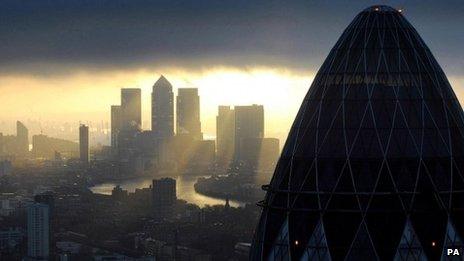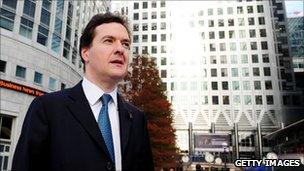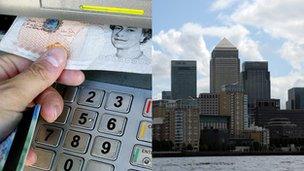Banking reform: What has changed since the crisis?
- Published

Five years on from the start of the credit crunch, the financial sector is now under more scrutiny than ever.
The banking system was saved from collapse by billions of pounds of taxpayers' money, which in turn led to anger that the public was having to bail out bankers, who were perceived as risk-taking and "greedy".
People wanted to see bosses held to account and a system introduced which would ensure this could not happen again.
So what has actually changed?
Pay and bonuses
Banks came under fire from taxpayers, shareholders and regulators over their pay policies, with bumper bonuses seen as "reward for failure".
In December 2010, European regulators announced tough restrictions on the bonuses that banks can pay their staff.
The rules meant that bankers could receive only 20-30% of their bonuses in immediate cash.
The guidelines required banks to defer 40-60% of bonuses for three to five years and pay 50% of bonuses in shares (rather than cash), set a maximum bonus level as a percentage of an individual's basic pay, and publish pay details for "senior management and risk takers".
Regulators have also encouraged banks to "claw back" pay - reclaiming compensation if an individual's performance is later not deemed worthy of the pay.
Several banks have said they have done this or are considering doing so. Lloyds has cut £2m from bonuses paid to 13 executives, including former chief executive Eric Daniels, for the bank's mis-selling of payment protection insurance (PPI).
JP Morgan has said it will claw back as much remuneration as possible, external from the individuals deemed responsible for losses of $5.8bn (£3.7bn) from trading in complex financial derivatives. This would amount to about two years' worth of pay for each individual.
Bank levy
In June 2010, the chancellor announced that banks operating in the UK would be hit with a levy - an annual tax on their balance sheets - in a joint move between the UK, France and Germany.

The idea was to raise more than £8bn for the Treasury over four years, with Mr Osborne saying that since the financial crisis began in banking, it was "fair and right" that banks should contribute to the economic recovery.
The government also hoped it would discourage banks from relying on risky forms of borrowing, which were blamed for making the financial crisis much more dangerous.
The levy was originally brought in as a temporary measure in January 2011 and was set at 0.04%.
But since then it has been made permanent and at the beginning of 2012 was increased to 0.088%.
The levy does not affect smaller banks and building societies, and certain items are exempt, including ordinary deposits covered by the UK's deposit insurance scheme.
Who pays if a bank fails
The government set up the Independent Commission on Banking, led by Sir John Vickers, with the aim of making the UK banking system safer. Its big idea was to set up a ring-fence to separate their retail operations from their riskier investment banking.
The retail bank businesses should have their own financial cushions, so that they can carry on independently in case something goes wrong with the rest of a bank's operations.

Following the Vickers recommendations, the government drafted a bill on bank reforms, the Financial Services (Banking Reform) Bill.
After criticism from the Parliamentary Commission on Banking Standards, a panel of MPs and peers led by Andrew Tyrie, that plans to ring-fence the banks "fell well short of what is required", the government agreed to "electrify" the ring-fence.
This means that a bank that fails to separate its investment and retail arms would be broken up.
As well as ring-fencing, the bill wants to rank retail deposits (but not pension liabilities) ahead of the claims of other bank creditors in the event of a bank insolvency.
It also wants banks to hold a sufficient capital buffer so that if they do fail, losses can be absorbed.
The bill has now gone before Parliament.
Regulation
Significant changes to the regulatory system of the UK's financial sector have been announced over the past couple of years.
The Financial Services Act, external will replace the current Tripartite structure, introduced by the previous Labour government, and made up of the Financial Services Authority (FSA), the Treasury and the Bank of England.
The Bank of England is responsible for keeping an eye on the money markets, the FSA supervises the individual banks and looks after the interests of consumers, while the Treasury provides the public money for this.
Critics say the system did not make clear who would be in charge in a crisis and the tripartite authorities needed to communicate better with each other.
In the overhaul, the FSA will be abolished, and three new bodies created, the first two within the Bank of England, to regulate financial services:
the Financial Policy Committee (FPC), which has already been formed, will have overall responsibility for financial regulation in the UK from 2013. It will oversee, and have the power to instruct, two new financial watchdogs
the Prudential Regulation Authority (PRA), which will take over responsibility for supervising the safety and soundness of individual financial firms
the Financial Conduct Authority (FCA), which will be tasked with protecting consumers from sharp practices, and making sure that workers in the financial services sector comply with rules
Savings protection
Ordinary people who have savings have long been protected from losing their money if their bank goes bust.
But since the onset of the crisis, the level of protection has more than doubled.
In 2007 the maximum payout for depositors was just £31,700 per person. Now it is £85,000, under the Financial Services Compensation Scheme.
Vetting executives
The FSA has moved to scrutinise more thoroughly banks' appointments of chief executives and board members in recent years.
The regulator has to approve anyone wanting to serve in "significant influence functions" (SIF) at financial companies.
It now uses formal panels to interview many would-be top executives., external
Former FSA chief executive Hector Sants has admitted that prior to the crisis the FSA did not do enough, external to assess the suitability of candidates or to look at the blend of individuals on a board.
Over the last two years, 39 SIF applications were withdrawn "demonstrably due to serious concerns identified by the FSA interview panel".
Once the FSA is replaced under the new regulatory system, the Financial Conduct Authority will be involved in SIF interviews and will have the right to veto individuals.